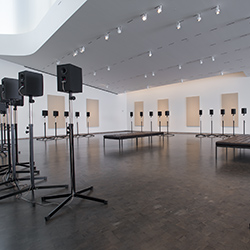Janet Cardiff
The Forty Part Motet
June 8–September 15, 2019

About the Work
Background on the Recording of The Forty Part Motet
In 1998 Janet Cardiff was given a CD of Thomas Tallis’s forty-part motet “Spem in Alium.” She was enthralled listening to it on a simple stereo system but was also frustrated at not being able to hear each part of the forty-part harmony separately. At the time, Cardiff envisioned creating a sound installation of “Spem in Alium” using forty loudspeakers; the listeners would play an active part in the mixing and blending of voices according to where they chose to stand, to listen, and to navigate the space. When Theresa Bergne of Field Art Projects invited her to participate in the Salisbury Festival in 2000, Cardiff suggested the idea of the piece as a sound sculpture in a large venue. After a year of research and organization, they were able to create the work, recording Spem in alium as part of the festival with singers from the Salisbury Cathedral Choir and elsewhere in England.
The sound installation involved a complex recording process. Written for forty parts—or distinct musical lines—the motet is divided into eight choirs of five parts each. Since Cardiff preferred the versions of the piece that use children’s, rather than women’s, voices for the soprano parts, twenty-seven boys and girls joined the thirty-two adult male choristers to provide the soprano voices.
The recording took place in a hall on the grounds of Salisbury Cathedral that was lined with blankets and curtains to create an acoustically “dead” sounding environment. During the recording session, the adult singers stood about five feet apart from one another in order to keep their voices separate, but the children were grouped together to sing the soprano parts of the composition. Each of the fifty-nine singers wore an individual high-quality lavalier microphone with a special mount to ensure that the microphone was positioned directly in front of him each singer. All fifty-nine cables were run from the singers to a mobile truck outside—in effect, the recording studio—where fifty-nine tracks were laid and then, mixing the sopranos together, reduced to forty.
When the singers took a break during the three-hour session, Cardiff and the editor, George Bures Miller, decided to keep recording; the singers talking and other sounds can be heard as a three-minute interlude in the final mix, creating an intimate, direct connection between the singers and the listeners. It was necessary to edit out each singer’s track when they were not singing so that the “cross talk” of the other singers would not interfere with the spatial quality of the final presentation.
“Spem in Alium” by Thomas Tallis, 1556/1573
| Choir 1 | Choir 2 | Choir 3 | Choir 4 | |
|
S S S S |
Thomas Cross Thomas Stockwell Matthew Stockwell Lawrence Best |
Charles Hughes Thomas Robinson-Woledge Jonathan Moody Raphael Hetherington |
Oliver Pash George White Oliver Campbell-Hill Evan Stockwell |
Olympia Hetherington Sophie Bradley Sofia Larsson |
| A | Stephen Abbott | Andrew Stewart | Mike Brown | Neil Baker |
| T | Chris Hobkirk | Nick Berry | Chris Dragonetti | David Martin-Smith |
| BA | Hugh Hetherington | Julian Hubbard | Grant Doyle | Simon Kapper |
| B |
Rory Waters |
John Robinson | James Skuse | Bob Thackray |
| Choir 5 | Choir 6 | Choir 7 | Choir 8 | |
|
S S S |
Danielle Green Camilla Godlee Alexandra Tyson |
Elizabeth Burrowes Lucinda Thompson-Mainland Beatrice Bathe |
Harriet Colley Rosalind Oglethorpe Anna Taylor |
India Webb Bryony Moody Grace Newcombe |
| A | Roger Mullis | Jules Gayle | Ben Lamb | Stephen Taylor |
| T | Ian Wicks | Roger Covey-Crump | Dennis Whitehead | Colin Howard |
| BA | Sandrey Date | Rob Evans | Steve Folkes | Phil Tebb |
| B | Jim McPherson | Ken Burgess | Simon Gaunt | Richard Hopper |
S Soprano A Alto T Tenor BA Baritone B Bass
Latin text
Spem in alium nunquam habui
Praeter in te, Deus Israel
Qui irasceris et propitius eris
et omnia peccata hominum
in tribulatione dimittis
Domine Deus
Creator caeli et terrae
respice humilitatem nostram
English translation
I have never put my hope in any other
but in Thee, God of Israel
who canst show both wrath and graciousness,
and who absolves all the sins
of suffering man
Lord God,
Creator of Heaven and Earth
Regard our humility
Choir Credits
Conductor: Simon Lole
Canon: Jeremy Davies
Conductor: Shelagh Lamb
Organist: David Halls
Organist Scholar: Clive Osgood
Sung by Salisbury Cathedral Choir